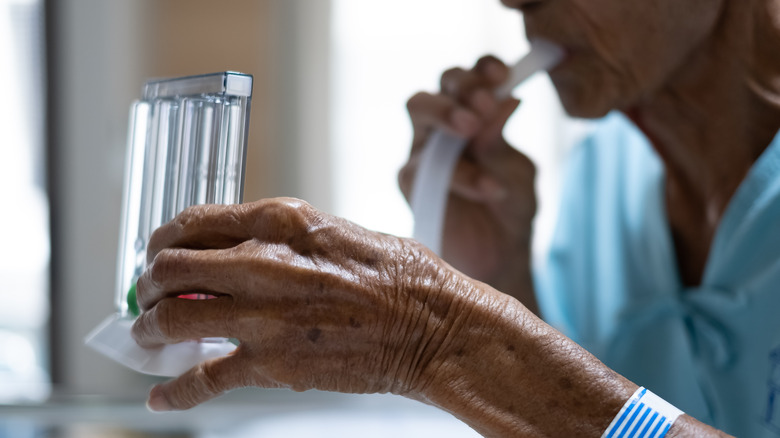Why You Should Never Skip Breathing Exercises Your Doctor Prescribes After Surgery
After any kind of surgery, it can feel hard to want to do much of anything. When faced with tasks from time-consuming physical therapy exercises to simply getting up for a drink of water, it can be tempting to just stay in bed. But experts recommend taking an active role in your recovery — and this includes making time for any breathing exercises your doctor prescribes.
When under general anesthesia, your breathing slows considerably, per Dr. Andrew Chung (via Health Pages). Not only do your breaths slow down, but they're more shallow, too. Because the breaths are not as deep, the air sacs in your lungs called alveoli don't fill all the way with air. This can cause them to flatten, which causes slowed breathing to continue, and can lead to complications like decreased oxygenation, pneumonia, and even respiratory failure. Because we're naturally inactive after surgery, may be in pain, and might be feeling side effects from medications, shallow breathing can continue for a while after surgery, especially after abdominal or chest surgery.
How to strengthen your lungs after surgery
Even though coughing or taking a deep breath might feel painful, it's important to expel any mucus that's lingering in the lungs post-surgery (via Penn Medicine). You can try holding a folded pillow over the incision site to reduce pain as you cough or breathe deeply.
You can use a tool called an incentive spirometer that measures the amount of air you can hold in your lungs, or you can simply do your breathing exercises on your own (via Penn Medicine). To practice deep breathing on your own, first make sure you're sitting upright or have the head of your bed raised as high as possible (via MedlinePlus). Hold a pillow against your incision if needed, take some normal breaths, and then take a slow, deep breath in and hold it for two to five seconds. Make an "O" shape with your lips and slowly breathe out gently through your mouth. Repeat this 10-15 times, or the number of times recommended by your doctor. Penn Medicine notes that it's important to cough after each breathing exercise session that you do, to make sure the mucus is expelled from the lungs.


